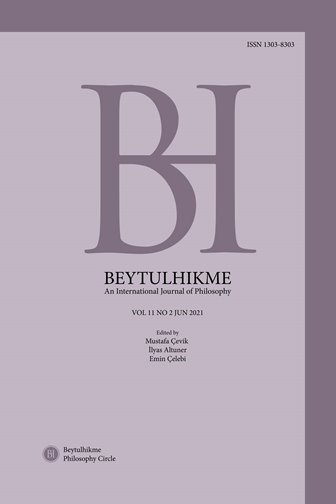Bireylerin Sosyal Medyadaki Etkileşimlerinin Yapay Zekâ Bağlamında Değerlendirilmesi ve Nagel’in Öteki Zihinler Problemine Yaklaşımı Açısından Kritiği
Author :
Abstract
Yapay zekâ çalışmaları, bilgisayar ve enformatik alanlarının en fazla önem verdiği konulardan biri olarak karşımıza çıkmaktadır. Zihin felsefesinin önemli problemlerinden biri de yapay zekâ çalışmaları çerçevesinde ortaya çıkan “öteki zihinler” problemidir. Öteki zihinler probleminin temelinde, bilince ait deneyimlerin öznel karakterinin belirleyici olduğu görülmektedir. Bir insanın ve insan dışındaki canlıların bir zihne sahip olduğunu ya da bilinçli olduğunu nereden biliyoruz? sorusu öteki zihinler probleminin temel sorusu olmaktadır. Bu problem, bugüne kadar dış dünya ve insanlarla olan toplumsal ilişkilerimizden yola çıkılarak ele alınmıştır. Bu doğrultuda, makalenin amacı bu problemin günümüz toplumunun sosyalleşme aracı ve mekânı olan sosyal medya üzerinden bir kritiğini yapmaktır. Sonuç olarak makalede, sosyal medya üzerindeki bireylerin varoluşlarının yapay zekâ çerçevesinde ve Nagel’in “öteki zihinler” problemine ilişkin ortaya koyduğu bilince ait deneyimin öznel karakteri argümanından da hareketle incelenmesi amaçlanmaktadır.
Keywords
Abstract
Artificial intelligence studies emerge as one of the most important issues in the fields of computer and informatics. One of the important problems of the philosophy of mind is the problem of "other minds" which we will evaluate within the framework of artificial intelligence studies. It is seen that the subjective character of the conscious experience determines the basis of the problem of other minds. The question “How do we know that a person and non-human creatures have a mind or are conscious,” is the main question of the problem of other minds. This problem has been addressed based on our social relations with the outside world and people so far. In this direction, the purpose of the article is to critique this problem through social media, which is the socialization media and space of today's society. In conclusion, in the article, it is aimed to examine the existence of individuals on social media within the framework of artificial intelligence and with reference to the argument of the subjective character of conscious experience that Nagel put forward regarding the problem of "other minds".
Keywords
- Adalı, E. (2017). Yapay Zekâ. İnsanlaşan Makineler ve Yapay Zekâ. (Haz. M. Karaca). İstanbul: İstanbul Teknik Üniversitesi Vakfı Yayınları, 8-13.
- Ayas, M. (2018). Yapay Zekâ - İnsandan Öte. Thinktech Araştırma Raporu, Ocak 2018. STM Teknolojik Düşünme Merkezi. https://thinktech.stm.com.tr/uploads/raporlar/pdf/232201818557919_stm_yapayzeka_insandanote_.pdf.
- Baudrillard, J. (1995). Kötülüğün Şeffaflığı: Aşırı Fenomenler Üzerine Bir Deneme. (Çev. E. Abora & I. Ergüden). İstanbul: Ayrıntı Yayınları.
- Baudrillard, J. (2011). Simülakrlar ve Simülasyon. (Çev. O. Adanır). İstanbul: Metis Yayınları.
- Chun, W. H. K. (2015). Crisis, Crisis, Crisis; or, The Temporality of Networks. The Nonhuman Turn. (Ed. R. Grusin). Minneapolis: University of Minnesota Press, 139-166.
- Çelebi, V. & İnal A. (2019). Yapay Zekâ Bağlamında Etik Problemi. Uluslararası Sosyal Araştırmalar Dergisi, 66, 651-661.
- Çelebi, V. (2015). Zihinsel Süreçlerin Fiziksel Olarak Açıklanma Süreci ve Fizika- lizm Eleştirisi. Felsefe Dünyası, 61, 127-152.
- Çelebi, V. (2019). Searle ve Nagel’in Bilinç Kuramlarında Fizikalizm Eleştirisi Bağ- lamında Yapay Zekânın Sınırı Tartışması. Beytulhikme An International Journal of Phlosophy, 9 (2), 351-376.
- Çelebi, V. (2020). Thomas Nagel’in Bilinç Kuramından Hareketle Diğer Zihinlerin Bilgisine Doğrudan Erişim Probleminin Değerlendirilmesi. Felsefe ve Sosyal Bilimler Dergisi, 29, 353-368.
- Dartmouth (1956). Artificial Intelligence (AI) Coined at Dartmouth. Erişim: 03.05.2021. https://250.dartmouth.edu/highlights/artificial-intelligence-ai-coined-dartmouth.
- Fuchs, C. (2014). Social Media: A Critical Introduction. London: SAGE Publications.
- Gödelek, K. (2013). Zihin Felsefesi. Eskişehir: Anadolu Üniversitesi Yayınları.
- Gunkel, D. J. (2012). Communication and Artificial Intelligence: Opportunities and Challenges for the 21st Century. Communication +1, 1 (1), 1-25.
- Ifrah, G. (2002). Bilgisayar Ne Sayar: Rakamların Evrensel Tarihi IX. (Çev. K. Din- çer). Ankara: Tübitak Yayınları.
- Kuçuradi, İ. (2020). İnsan İlişkilerini Becermek Mars'a Gitmekten Zor. Erişim: 12.02.2021. https://www.youtube.com/watch?v=SQ7soJHTZ9g.
- Nagel, T. (1974). What Is It Like to Be a Bat? The Philosophical Review, 83 (4), 435- 450.
- Nagel, T. (2004). Her Şey Ne Anlama Geliyor: Felsefeye Küçük Bir Giriş. (Çev. H. Gün- doğdu). İstanbul: Paradigma Yayınları.
- Peter, J. & Kühne, R. (2018). The New Frontier in Communication Research: Why We Should Study Social Robots. Media and Communication, 6 (3), 73-76.
- Qi, J. & Monod, E. & Fang B. & Deng, S. (2018). Theories of Social Media: Philo- sophical Foundations. Engineering, 4 (1), 94-102.
- Turing, A. M. (1950). Computing Machinery and Intelligence. Mind, 49, 433-460.
- Warburton, N. (2019). Felsefeye Giriş. (Çev. K. Cankoçak & M. A. Arslan). İstanbul: Alfa Yayınları.
- Zhao, S. (2006). Humanoid Social Robots as a Medium of CommunicationNew Media Society, 8 (3), 401-419. Öz: Yapay zekâ çalışmaları, bilgisayar ve enformatik alanlarının en fazla önem verdiği konulardan biri olarak karşımıza çıkmaktadır. Zihin felsefesinin önemli problemlerinden biri de yapay zekâ çalışmaları çerçevesinde ortaya çıkan “öteki zihinler” problemidir. Öteki zihinler probleminin temelinde, bilince ait deneyimlerin öznel karakterinin belirleyici olduğu görülmektedir. Bir insanın ve insan dışındaki canlıların bir zihne sahip olduğunu ya da bilinçli olduğunu nereden biliyoruz? sorusu öteki zihinler probleminin temel sorusu olmaktadır. Bu problem, bugüne kadar dış dünya ve insanlarla olan toplumsal ilişkilerimizden yola çıkılarak ele alınmıştır. Bu doğrultuda, makalenin amacı bu problemin günümüz toplumunun sosyalleşme aracı ve mekânı olan sosyal medya üzerinden bir kritiğini yapmaktır. Sonuç olarak makalede, sosyal medya üzerindeki bireylerin varoluşlarının yapay zekâ çerçevesinde ve Nagel’in “öteki zihinler” problemine ilişkin ortaya koyduğu bilince ait deneyimin öznel karakteri argümanından da hareketle incelenmesi amaçlanmaktadır. Anahtar Kelimeler: Nagel, yapay zekâ, öteki zihinler, birey, bilinç, sosyal medya.





